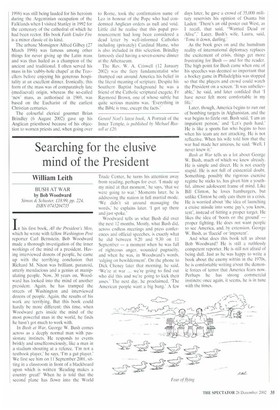Searching for the elusive mind of the President
William Leith
BUSH AT WAR by Bob Woodward Simon & Schuster, V8.99, pp. 224, ISBN 0743204735 In his first book, All the President's Men, which he wrote with fellow Washington Post reporter Carl Bernstein, Bob Woodward made a thorough investigation of the inner workings of the mind of a president. Having interviewed dozens of people, he came up with the terrifying conclusion that Richard M. Nixon was brilliant, paranoid, utterly mendacious and a genius at manipulating people. Now, 30 years on, Woodward has looked into the mind of another president. Again, he has tramped the streets of Washington and interviewed dozens of people. Again, the results of his work are terrifying. But this book could hardly be more different; this time, when Woodward gets inside the mind of the most powerful man in the world, he finds he hasn't got much to work with.
In Bush at War, George W. Bush comes across as a deeply normal man with passionate instincts. He responds to events briskly and unselfconsciously, like a man in a stadium shouting at a referee. 'I'm not a textbook player,' he says, 'I'm a gut player.' We first see him on 11 September 2001, sitting in a classroom in front of a blackboard upon which is written 'Reading makes a country great!' When he is told that the second plane has flown into the World
Trade Center, he turns his attention away from reading, perhaps for ever. 'I made up my mind at that moment,' he says, 'that we were going to war.' Moments later, he is addressing the nation in full martial mode. 'We didn't sit around massaging the words,' he explains later. 'I got up there and just spoke.'
Woodward tells us what Bush did over the next 12 months. Mostly, what Bush did, across endless meetings and press conferences and official speeches, is exactly what he did between 9.20 and 9.30 on 11 September — a moment when he was full of righteous anger, wounded pugnacity, and when he was, in Woodward's words, 'edging on bewilderment'. On the phone to Dick Cheney later that morning, he said,
'We're at war we're going to find out who did this and we're going to kick their asses.' The next day, he proclaimed, 'The American people want a big bang.' A few
days later, he gave a crowd of 35,000 military reservists his opinion of Osama bin Laden: 'There's an old poster out West, as I recall, that said, "Wanted Dead or Alive".' Later, Bush's wife, Laura, said, 'Tone it down, darling.'
As the book goes on and the humdrum reality of international diplomacy replaces the excitement of crisis, things get more frustrating for Bush — and for the reader. The high point for Bush came when one of his speeches was deemed so important that a hockey game in Philadelphia was stopped so that the players and crowd could watch the President on a screen. 'It was unbelievable,' he said, and later confided that 'I have never felt more comfortable in my life.'
Later, though, America begins to run out of bombing targets in Afghanistan, and the war begins to fizzle out. Bush said, 'I am an impatient person,' and 'Let's push hard.' He is like a sports fan who begins to boo when his team are not attacking. He is not reflective. When his wife told him that the war had made her anxious, he said, 'Well, I never knew it.'
Bush at War tells us a lot about George W. Bush, much of which we knew already. He is simple and direct. He is not exactly stupid. He is not full of existential doubt. Something, possibly the rigorous exercise regime he sticks to, has ghen him a youthful, almost adolescent frame of mind. Like Bill Clinton, he loves hamburgers, but unlike Clinton he only eats them in a crisis. He is worried about 'the idea of launching a cruise missile into some guy's, you know, tent', instead of hitting a proper target. He likes the idea of 'boots on the ground' — proper fighting. He does not want people to see America, and, by extension, George W, Bush, as 'flaccid' or 'impotent'.
And what does this book tell us about Bob Woodward? He is still a ruthlessly competent reporter. He is still not afraid of being dull. Just as he was happy to write a book about the enemy within in the 1970s, he is comfortable writing about the demonic forces of terror that America fears now. Perhaps he has strong commercial instincts; once again, it seems, he is in tune with the times.


























































 Previous page
Previous page